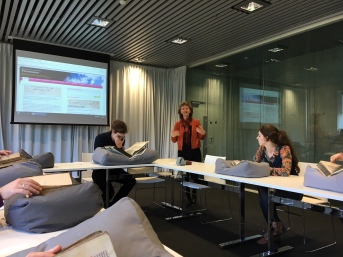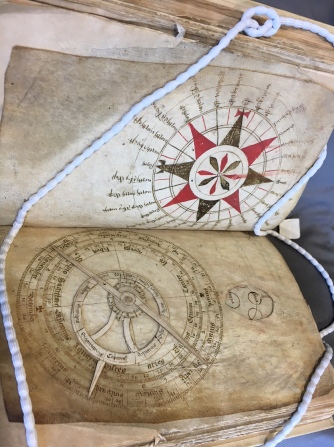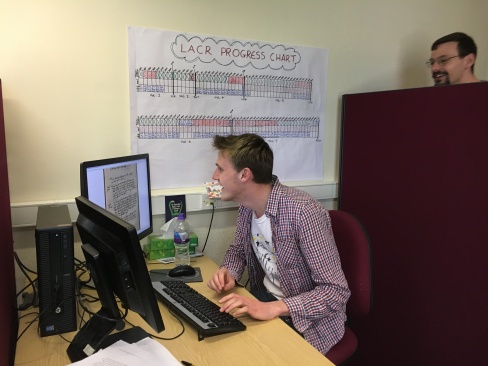Postgraduate Class Trip: Aberdeen
May 21, 2018 1 Comment
Blog written by Dr Margaret Connolly
 Students taking palaeography as part of the MLitt programmes in Medieval History and Medieval Studies headed up to Aberdeen last week to see manuscripts at the University Library and to visit the Aberdeen Burgh Records Project.
Students taking palaeography as part of the MLitt programmes in Medieval History and Medieval Studies headed up to Aberdeen last week to see manuscripts at the University Library and to visit the Aberdeen Burgh Records Project.
The St Andrews group led by Dr Margaret Connolly and Mrs Rachel Hart were welcomed to the Special Collections at the Sir Duncan Rice Library by Andrew Macgregor, Deputy Archivist. We spent about an hour browsing a selection of fifteenth-century manuscripts chosen to reflect the wide range of reading material available in the British Isles at the end of the Middle Ages.
These included the first volume of the unique devotional text The Myrrour of Oure Lady which belonged to a nun at Syon Abbey in London (volume two is in Oxford), and a volume of Latin sermons that belonged to Hinton Charterhouse in Somerset; also the popular collection of saints’ lives, Legenda Aurea, and three books of hours – one so tiny it fits into the palm of the hand. By contrast, the copy of John Trevisa’s vernacular translation of Higden’s Polychronicon was a huge volume. Some of the texts, such as the De Cosmographia of Pomponius Mela, and a medical textbook were the type of books that would have been read in universities – the commentary on Aristotle’s Physica that we saw, which was written at Louvain in 1467, was owned in the next century by a member of St Andrews University. Other books, such as the collection of medical recipes, and the miscellany of practical and other texts, were probably used in individual medieval households.
Here are some reactions to what we saw:

The ‘twirly thing’: the MS123 volvelle – a rare example with all of its fragile paper pointers intact
‘The manuscripts we looked at in the first half were so amazing, I completely lost track of time when we were looking at them. My favourite was the collection of miscellaneous works, with the clairvoyant dice, the zodiac man, and the twirly thing.’
Before leaving Special Collections we got to see behind the scenes with a tour of the stores where we enjoyed rummaging amongst the early printed books – and of their state-of-the-art conservation suite.
Then in the afternoon we visited Humanity Manse to see the Aberdeen Burgh Records Project, where we were hosted by St Andrews graduate Dr Claire Hawes and Dr William Hepburn. William is a graduate of Glasgow, and had tutored two of our current MLitt students whilst they were undergraduates there – a nice connection. Claire and William explained the work of the project, and demonstrated how joint work with computer scientists had created a programme that supports the transcription of this massive series of records.
They also provided insight into the practical uses of palaeography, and showed what a job that involved palaeography was like, which was arguably the most useful part of the day. It was also great to get to see some of the original records – these have World Heritage Status – thanks to Phil Astley of Aberdeen City Council who brought them along specially for our visit.
Some final thoughts:
‘The trip was so much fun, I really enjoyed how laid back it was. After the busiest two weeks of the whole degree, I found it so relaxing to spend time with some fantastic material just for interest’s sake.’
‘Getting to see all this, without having to worry about how this would relate to your next deadline, was refreshing and has got me thinking about the opportunities for working in this area in the future.’
Pingback: Special Collections Teaching 2017-2018 Candlemas Semester | Echoes from the Vault